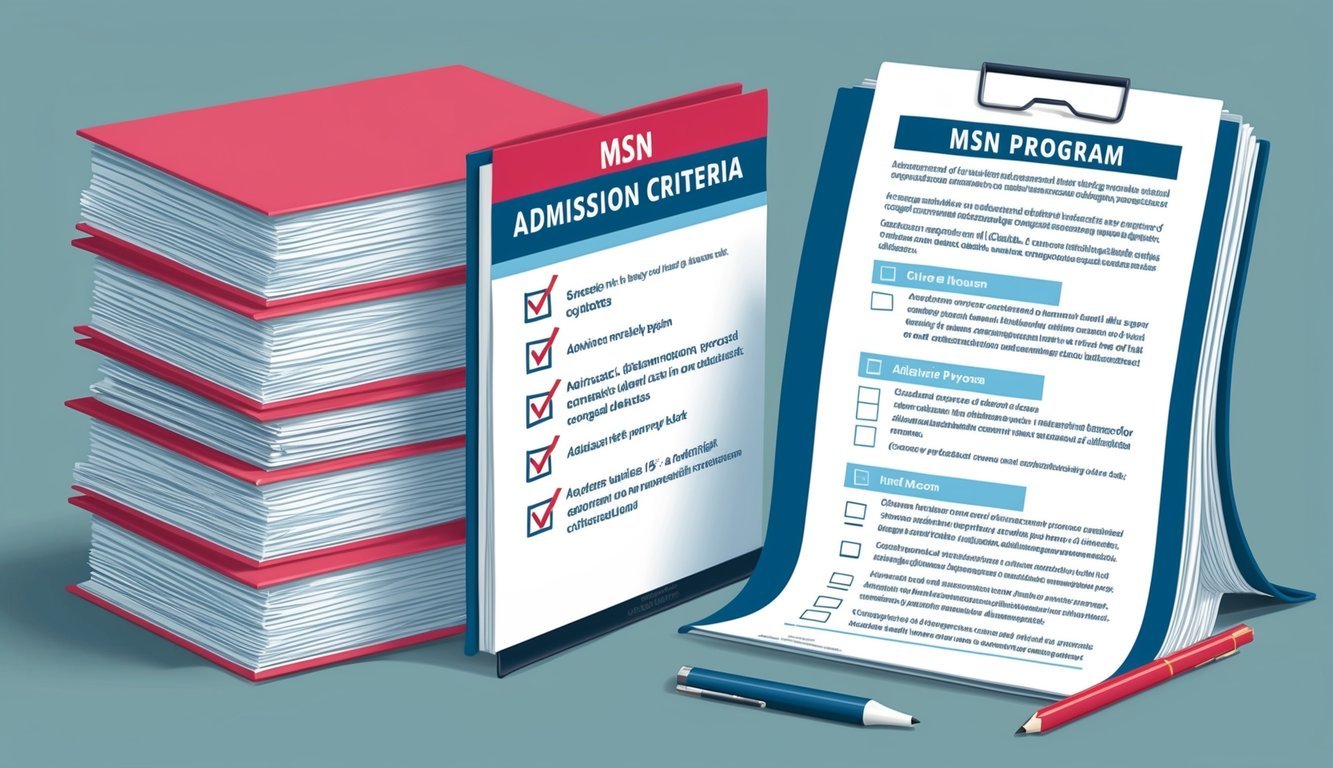As a registered nurse (RN) with an Associate Degree in Nursing (ADN), you may be considering how to elevate your career.
Transitioning from an ADN to a Master of Science in Nursing (MSN) can open doors to advanced nursing practice roles such as nurse practitioner, nurse educator, or nurse administrator.
The ADN to MSN pathway allows you to build on your existing nursing foundation while gaining critical leadership and specialized skills that are increasingly in demand in the healthcare sector.
Enrolling in an RN to MSN program offers you a streamlined approach to achieving your master’s degree without the requirement of first obtaining a Bachelor of Science in Nursing (BSN).
This not only shortens the time needed to advance your education but also enhances your qualifications for various nursing specialties.
Many programs, such as those offered by institutions like Northeastern State University and University of St. Augustine for Health Sciences, are designed to support your journey by combining online coursework with clinical experiences.
Pursuing an ADN to MSN can significantly impact your career trajectory by expanding your scope of practice and potential earning power.
With the healthcare landscape constantly evolving, acquiring an advanced degree prepares you to meet the challenges of patient care and healthcare leadership head-on.
As the demand for highly skilled nurses continues to rise, now is the perfect time to consider this valuable educational pathway.
Understanding ADN to MSN Pathways
ADN to MSN pathways provide nurses with the opportunity to advance their education and career.
Through various program options, you can transition from an Associate Degree in Nursing (ADN) to a Master of Science in Nursing (MSN), allowing you to open doors to advanced practice roles.
Differences Between ADN and BSN
The Associate Degree in Nursing (ADN) is typically a two-year program that focuses on the essential skills needed for entry-level nursing positions.
It prepares you for the NCLEX-RN licensure exam, allowing you to practice as a Registered Nurse.
In contrast, the Bachelor of Science in Nursing (BSN) is a four-year degree that includes additional training in leadership, research, and community health.
This broader educational foundation may enhance your job prospects, as many employers prefer or require a BSN for advanced roles.
| Feature | ADN | BSN |
|---|---|---|
| Duration | 2 years | 4 years |
| Focus | Clinical skills | Leadership, research |
| Scope | Entry-level nursing roles | Advanced clinical roles |
Types of RN to MSN Programs
There are several types of RN to MSN programs tailored to your educational and career aspirations.
Some common pathways include:
- Traditional RN to MSN: This route allows RNs with an ADN to directly pursue an MSN.
- Accelerated Programs: Designed for individuals with a non-nursing bachelor’s degree, these programs expedite the transition into nursing.
- Online Hybrid Options: These programs combine online coursework with in-person clinical training, providing flexibility while ensuring hands-on experience.
These programs typically range from 2 to 3 years in duration and may offer specializations such as Nurse Practitioner or Nurse Educator, broadening your career potential.
Bridge Programs Explained
Bridge programs are structured to ease your transition from an ADN to an MSN.
These programs often incorporate the BSN curriculum into the MSN course structure, allowing you to earn both degrees efficiently.
For example, a bridge RN to MSN program may enable you to complete your BSN requirements while advancing toward your MSN.
Admission usually requires a valid RN license and proof of your ADN program completion.
Key benefits of bridge programs include:
- Time efficiency: Accelerated tracks can shorten your educational timeline.
- Comprehensive training: You gain a wider educational foundation.
- Enhanced credentials: Graduating with both a BSN and an MSN can improve job prospects.
Learn more about these options through resources like ANA and other nursing education platforms.
Admission Criteria and Academic Requirements

Understanding the admission criteria and academic framework for ADN to MSN programs is crucial for prospective students.
This section details the standard requirements, course load, and curriculum essentials to help you navigate your path to advanced nursing education.
Standard Admission Requirements
To be considered for an ADN to MSN program, you typically need to meet specific criteria.
Commonly required items include:
- Minimum GPA: Most programs require a minimum GPA of 3.0 on a 4.0 scale. Some institutions may consider lower GPAs with additional documentation.
- TOEFL Scores: For non-native English speakers, a TOEFL score of 80-100 may be needed to demonstrate English proficiency.
- Clinical Experience: Prior clinical experience as a registered nurse is often essential, along with a valid RN license.
- Personal Interview: A personal interview may be required for selection, allowing you to showcase your commitment and passion for nursing.
Program Length and Course Load
The length of ADN to MSN programs can vary, generally spanning from 3 to 4 years.
Factors affecting the duration include:
- Part-time vs. Full-time: You can choose between part-time or full-time enrollment, impacting your overall completion time.
- Transfer Credits: If you have previously completed relevant coursework, transferring credits can reduce your program length.
- Clinical Hours: Required clinical hours can range from 500 to 1,000, depending on your program’s focus and state requirements.
The program will also have you manage a course load of 9-15 credits per semester, which may include core nursing courses, electives, and clinical practice.
MSN Curriculum Overview
The MSN curriculum is designed to prepare you for advanced practice roles, covering essential topics such as:
- Nursing Theory and Practice: Courses will integrate theoretical knowledge with practical applications.
- Specialization Tracks: You may choose from various tracks, such as Nursing Administration or Nursing Education.
- Capstone Project: Many programs require a capstone project or thesis, enabling you to apply your learning in real-world settings.
Clinical practice is a significant component of the curriculum, ensuring you gain hands-on experience in your chosen specialty area.
Schools may have partnerships with healthcare facilities to facilitate clinical placements, optimizing your training and exposure to professional environments.
Specializations and Advanced Practice Roles

In the journey from ADN to MSN, you will encounter various specializations that enhance your practice and prepare you for advanced roles.
Understanding these key positions can help you determine which path aligns with your career goals.
Family Nurse Practitioner (FNP)
As a Family Nurse Practitioner (FNP), you will provide comprehensive primary care across all ages.
FNPs focus on health promotion, disease prevention, and managing chronic conditions.
Your duties may include conducting physical exams, ordering and interpreting diagnostic tests, and prescribing medications.
FNPs often serve as the first point of contact for patients.
This role emphasizes developing strong, long-term relationships with families and communities.
With the increasing demand for primary care providers, pursuing an FNP specialization can be a fulfilling career choice.
For more on this specialty, read about the benefits of becoming an FNP.
Adult-Gerontology Primary Care Nurse Practitioner
If you choose to specialize as an Adult-Gerontology Primary Care Nurse Practitioner, your focus will be on adults ranging from young adults to the elderly.
This role equips you to assess, diagnose, and treat various health conditions affecting this age group.
You will gain expertise in managing chronic diseases, conducting wellness exams, and providing transitional care.
Your education will prepare you to address the unique healthcare needs of aging populations, emphasizing preventive care and patient education.
The need for skilled providers in this area is growing.
Learn more about this specialization’s responsibilities and education requirements in the ANA guide.
Psychiatric/Mental Health Nurse Practitioner
As a Psychiatric/Mental Health Nurse Practitioner (PMHNP), your role is pivotal in addressing mental health challenges.
You will diagnose and treat individuals experiencing mental health disorders, utilizing both pharmacological and therapeutic approaches.
Your training will prepare you to conduct comprehensive mental health assessments and develop personalized treatment plans.
PMHNPs often work in various settings, including hospitals, clinics, and private practices, providing critical support to patients.
The rising awareness and treatment demand for mental health services make this specialization vital.
Explore how to transition into this rewarding field of practice through various resources on nurse.org.
Clinical Practice and Hands-On Experience
Gaining clinical practice and hands-on experience is essential for your transition from ADN to MSN.
This phase involves meeting specific requirements and participating in in-person clinicals that consolidate your learning through practical application.
Clinical Experience Requirements
In many ADN to MSN programs, you are required to complete a set number of clinical hours.
These hours can vary by program, typically ranging from 500 to 1,000 hours, depending on the specific nurse practitioner track.
| Program Type | Clinical Hours Required |
|---|---|
| RN to MSN | 500 – 1,000 hours |
| Direct-Entry MSN | 600 – 1,200 hours |
These hours are designed to allow you to apply evidence-based practice in real-world settings, enhancing your nursing skills and understanding of patient care.
Clinical experiences may include various specialties, such as pediatrics, family health, or acute care, allowing you to tailor your training to your career goals.
In-Person Clinicals and Simulations
In-person clinicals are a crucial component of your education.
They provide firsthand experience in handling patient care scenarios under the supervision of experienced clinicians.
Simulations also play a role in honing your skills.
You will engage in realistic scenarios that replicate clinical situations, which help prepare you for actual patient interactions.
This combined approach reinforces your clinical nurse leadership abilities and ensures competency in nursing practices.
Financing Your Education
Navigating the financial aspects of advancing your education can be challenging.
Understanding tuition costs, available financial aid, and the long-term benefits of your investment is crucial for making informed decisions.
Tuition and Fees
Tuition costs for ADN to MSN programs can vary significantly based on the institution and program type.
Typically, tuition rates range from $10,000 to $40,000 for the entire program.
Here’s a simple breakdown of potential costs you might encounter:
| Expense | Estimated Cost |
|---|---|
| Tuition | $10,000 – $40,000 |
| Books and Supplies | $1,000 – $2,000 |
| Application Fees | $50 – $200 |
| Laboratory Fees | $300 – $800 |
You can use a tuition calculator to estimate your total expenses more accurately.
Also, consider any hidden fees that may arise, such as technology or registration fees.
Financial Aid and Scholarships
Many programs offer financial aid options to support your education.
About 70% of nursing students secure loans, with federal student loan programs being a common choice.
These loans often have low-interest rates and flexible repayment plans.
You should also explore scholarships specifically for nursing students.
For example, the Association of Rehabilitation Nurses awards scholarships of $1,500 to graduate nursing students with two years of experience in rehabilitation nursing.
Creating a financial aid strategy early can help ensure you maximize resources available to you.
Investing in Long-Term Career Growth
Financing your education is not just about initial costs; it’s an investment in your future.
Earning an MSN degree can lead to significant salary increases and career advancement.
For instance, nurse practitioners (FNPs) typically earn salaries that can exceed $100,000 annually.
While you may incur debt during your studies, the potential return on investment can be substantial.
Many employers also offer tuition reimbursement programs to incentivize your continued education.
This can further alleviate costs and enhance your financial situation.
Framing your education as a long-term investment will likely show its value far outweighs the initial expenses.

